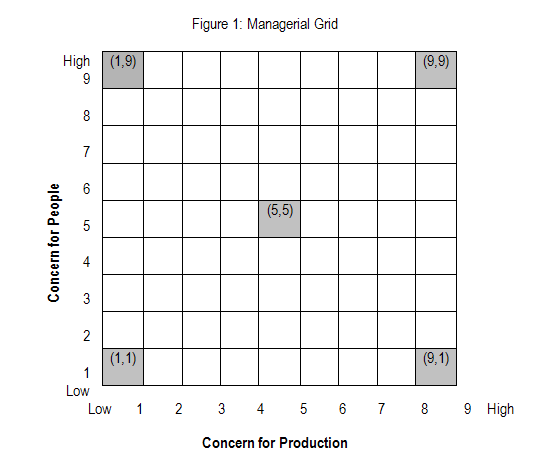Working in a production environment but not in production itself allows me to observe from afar, noting how leaders perform and how teammates accept their leaders guidance. Currently my role is keeping the peace basically, making sure everyone feels as though they are heard and understood. Ensuring communication between first, second, third line managers, directors and teammates is also key to a successful production environment with content teammates. An ideal manager in a production environment who can work with people well and keep results high is either middle-of-the-road management (5,5) or Team Management (9,9). The rest of the major leadership styles, I have seen first hand, prove to be unsuccessful in making teammates happy and preforming successfully in production.
The management styles from Blake and Mouton’s Managerial (Leadership) Grid are Authority-Compliance (9,1), Country-Club Management (1,9), Impoverish Management (1,1), Middle-of-the-Road Management (5,5) and Team Management (9,9) (Northouse, 2013). Managers that fall under the style of impoverish management (1,1) are not very concerned for their teammates or the job itself, this is obvious with the happiness of the group and what they produce. The manager is constantly questioned by upper management on performance and why it is so terrible until they decide to the manager out of that role. Country-Club Management (1,9) is a style I see often where I work, these managers are loved by their people and most everyone on the production floor wants to work for them but upper management is not seeing results. This creates a problem that is often confusing for upper management, if their people love their style so much it seems as though it would be easy to coach the teammates to do the job properly. The lack of interest in the job is the problem, not the individuals working for the manager. Authority-Compliance management (9, 1) is all about getting the job done, not very personable or helpful when it comes to issues outside of the job itself with teammates, people do not enjoy working for this manager but they are doing their job and upper management sees results. This style of management can be very dangerous for a happy production enviornment. Those three management styles are the least ideal ones to adopt where I work. Currently we have a struggle with communication to the teammates and managers pushing hard for productivity, which creates a problem, unhappy teammates.
The ideal first line manager style should be team management (9,9) on the leadership grid with a strong connection to the teammates they manage and clear and concise understanding of the production environment they are managing. I would consider the style team management to be what is wanted out of every manager, this will ensure success all around but that is not the case. It has become a hope to get a manager that falls into the style of middle-of-the-road management (5,5), who keeps performance on track and the teammates happy, working well together and producing a quality product. There is also room for growth with a middle-of-the-road manager, they can be coached to become a team manager much easier than the management styles of authority-compliance, country-club, and impoverish management.
There is room to grow for all styles of management that fall on Blake and Mouton’s grid, the managers that fall closest to middle-of-the-road management and team management are the most successful and ideal to have running the production floor teams that I have seen. All managers have room for improvement but ideally production would be smooth running and people would be happy with managers that cared about individuals, as teammates and ensuring the jobs they are working on are successful.
Reference:
Blake , R., & Jane , M. (n.d.). Managerial grid. Retrieved from http://managementstudyguide.com/blake-mouton-managerial-grid.htm
Northouse, P.G. (2013). Leadership: Theory and Practice. Los Angeles: Sage Publications.


A “well rounded” manager is basically what is being described. Those are the managers that most people feel are tough but fair and somewhat personable. As long as they have a little bit of everything, and a basis of everything, they most certainly can be improved upon. I currently have a manager that has an “impoverish management” style. He has a conference call every Friday with upper level management because we do not get enough people signing up for our free coupon catalogs. We are apparently the worst store in the district, and no one is happy. He tells us everyday that we need more of them, making him appear as “authority-compliance”, but he is not out there on the floor at all seeing what the cashiers deal with. As a matter of fact, he refuses to even do any cashiering duties – our assistant managers will though. While he acts as though he cares, he is not personable at all, and has terrible managerial skills in general. I think that if he were even a little bit skewed towards “country club,” we may not mind working for him as much. Unfortunately, that is not the case, and he does not try to really enforce anything in our scheme of production. There would be room for plenty of improvement, except he seems past the point of help. He treats the company more like a hobby than a job or passion or anything remotely related to management.